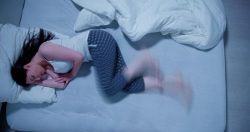The Connection Between Restless Leg Syndrome and Sleep Apnea
December 1, 2023
High-quality sleep is an essential component of good health, so anything that interferes with the quality of your rest should be taken seriously, including both restless leg syndrome and sleep apnea. On its own, either one of these conditions can significantly reduce the amount of rejuvenating sleep that you are able to enjoy. When they occur simultaneously, the situation is even worse. What exactly is the connection between restless leg syndrome and sleep apnea, and how might you be able to find relief? This blog post offers some practical information.
Restless Leg Syndrome and Sleep Apnea: An Overview
Restless leg syndrome (RLS) is a condition that causes a person to have an almost irresistible urge to move their legs; it tends to be worse during the evening. More than three million people in the U.S. are diagnosed with RLS each year.
Obstructive sleep apnea (OSA) causes pauses in breathing while a person is asleep. These pauses, called apneas, disrupt the sleep cycle and can leave a person feeling exhausted day after day. OSA is also associated with an increased risk of numerous systemic health conditions, such as heart problems and unwanted weight gain.
How Are They Connected?
Both OSA and RLS can afflict people of any age, although they both tend to occur more frequently in older individuals. One study even found that among people with OSA, 8.3% of them had symptoms of RLS 2 – 3 times a week. Significantly, only 2.5% of participants without OSA had serious RLS symptoms.
Of course, that does not necessarily mean that RLS causes OSA or vice versa. These conditions can be exacerbated by common factors, such as smoking, overconsumption of caffeine, and drinking alcohol too late in the day.
How Can You Find Relief?
Here are some tips that might help you to find relief from both RLS and OSA:
- Practice good sleep hygiene. Your bedroom should be clean, dark, and a little on the cool side. Try to go to bed at the same time each night.
- Take a hot bath. Not only is a hot bath relaxing, but many people find that it can reduce RLS symptoms.
- Stick to good habits. You may need to quit smoking or adjust your caffeine or alcohol intake.
- Seek OSA treatment. Research suggests that professional sleep apnea treatment may reduce the need for the medications that are commonly used to address RLS.
You deserve to enjoy rejuvenating, high-quality rest! Take steps to manage your conditions so you can enjoy the best health possible.
Meet the Practice
Dr. Kenneth Mogell is double board-certified in dental sleep medicine. For well over a decade, he has devoted himself to helping patients throughout our area find relief from OSA via oral appliance therapy. If you are curious about how our team may be able to help you enjoy higher-quality rest night after night, contact any of our locations or call our Vero Beach office at 772-882-6800.
